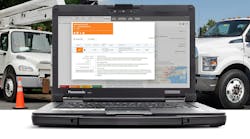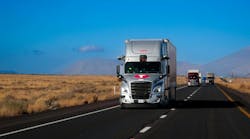Beginning December 1st, commercial truckers must equip their rigs with radio frequency identification (RFID) tags from PierPASS to gain access to the marine container terminals at the Ports of Los Angeles and Long Beach.
Vehicles not equipped with a PierPASS “TruckTag” device will be processed through exception handling, which may deny access or processing via a trouble ticket, the company said. Trucking companies that have already received tags should install the tags on their trucks now and register the tag numbers in the eModal TruckerCheck program, which will activate the truck in the system.
“Implementing the TruckTag program enhances the security of Southern California’s marine terminals without hindering the flow of goods that keeps our economy running,” said Bruce Wargo, president and CEO of PierPASS. “Marine terminals will continue doing their part to help make our ports and our people safe and secure.”
He noted the TruckTag program is a part of an overall effort by marine terminal operators in Los Angeles and Long Beach to meet U.S. Department of Homeland Security and U.S. Coast Guard guidelines requiring marine terminals to enhance their security measures.
Similar to E-Z Pass and FasTrak automated systems, RFID tags installed on the truck’s driver-side rearview mirror are automatically read at marine terminal gate entrances using specialized scanning antennas that validate the security clearance of the truck, said Wargo. As part of the system, the truck driver’s commercial driver’s license is checked to verify they are authorized by their truck company to enter the port facility on their behalf.
He noted that RFID tag readers have been installed at most PierPASS member terminals in the two ports, and member terminals are working to have all gates equipped with tag readers by December. To date, Wargo said PierPASS has distributed more than 16,000 tags and will process requests for about 1,000 more in the next few weeks. Roughly 70% of those tags have been registered and activated, he added, and stressed that they are free to truckers.
The ports of Los Angeles and Long Beach together handle more than 40% of the nation’s total import traffic and 24% of its total exports, requiring on average more than 180,000 truck deliveries to and from the marine terminals every week.


